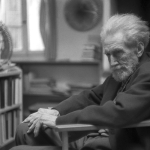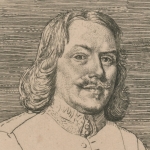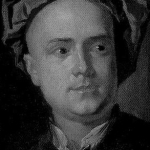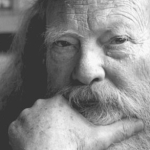And before hell mouth; dry plain
and two mountains;
On the one mountain, a running form,
and another
In the turn of the hill; in hard steel
The road like a slow screw’s thread,
The angle almost imperceptible,
so that the circuit seemed hardly to rise;
And the running form, naked, Blake,
Shouting, whirling his arms, the swift limbs,
Howling against the evil,
his eyes rolling,
Whirling like flaming cart-wheels,
and his head held backward to gaze on the evil
As he ran from it,
to be hid by the steel mountain,
And when he showed again from the north side;
his eyes blazing toward hell mouth,
His neck forward,
and like him Peire Cardinal.
And in the west mountain, Il Fiorentino,
Seeing hell in his mirror,
and lo Sordels
Looking on it in his shield;
And Augustine, gazing toward the invisible.
And past them, the criminal
lying in the blue lakes of acid,
The road between the two hills, upward
slowly,
The flames patterned in lacquer, crimen est actio,
The limbo of chopped ice and saw-dust,
And I bathed myself with acid to free myself
of the hell ticks,
Scales, fallen louse eggs.
Palux Laerna,
the lake of bodies, aqua morta,
of limbs fluid, and mingled, like fish heaped in a bin,
and here an arm upward, clutching a fragment of marble,
And the embryos, in flux,
new inflow, submerging,
Here an arm upward, trout, submerged by the eels;
and from the bank, the stiff herbage
the dry nobbled path, saw many known, and unknown,
for an instant;
submerging,
The face gone, generation.
Then light, air, under saplings,
the blue banded lake under æther,
an oasis, the stones, the calm field,
the grass quiet,
and passing the tree of the bough
The grey stone posts,
and the stair of gray stone,
the passage clean-squared in granite:
descending,
and I through this, and into the earth,
patet terra,
entered the quiet air
the new sky,
the light as after a sun-set,
and by their fountains, the heroes,
Sigismundo, and Malatesta Novello,
and founders, gazing at the mounts of their cities.
The plain, distance, and in fount-pools
the nymphs of that water
rising, spreading their garlands,
weaving their water reeds with the boughs,
In the quiet,
and now one man rose from his fountain
and went off into the plain.
Prone in that grass, in sleep;
et j’entendis des voix:…
wall . . . Strasbourg
Galliffet led that triple charge. . . Prussians
and he said [Plarr’s narration]
it was for the honour of the army.
And they called him a swashbuckler.
I didn’t know what it was
But I thought: This is pretty bloody damn fine.
And my old nurse, he was a man nurse, and
He killed a Prussian and he lay in the street
there in front of our house for three days
And he stank. . . . . . .
brother Percy,
And our Brother Percy…
old Admiral
He was a middy in those days,
And they came into Ragusa
. . . . . . place those men went for the Silk war. . . . .
And they saw a procession coming down through
A cut in the hills, carrying something
The six chaps in front carrying a long thing
on their shoulders,
And they thought it was a funeral,
but the thing was wrapped up in scarlet,
And he put off in the cutter,
he was a middy in those days,
To see what the natives were doing,
And they got up to the six fellows in livery,
And they looked at it, and I can still hear the old admiral,
“Was it? it was
Lord Byron
Dead drunk, with the face of an A y n. . . . . . . .
He pulled it out long, like that:
the face of an a y n . . . . . . . . gel.”
And because that son of a bitch,
Franz Josef of Austria. . . . . .
And because that son of a bitch Napoléon Barbiche…
They put Aldington on Hill 70, in a trench
dug through corpses
With a lot of kids of sixteen,
Howling and crying for their mamas,
And he sent a chit back to his major:
I can hold out for ten minutes
With my sergeant and a machine-gun.
And they rebuked him for levity.
And Henri Gaudier went to it,
and they killed him,
And killed a good deal of sculpture,
And ole T.E.H. he went to it,
With a lot of books from the library,
London Library, and a shell buried ‘em in a dug-out,
And the Library expressed its annoyance.
And a bullet hit him on the elbow
…gone through the fellow in front of him,
And he read Kant in the Hospital, in Wimbledon,
in the original,
And the hospital staff didn’t like it.
And Wyndham Lewis went to it,
With a heavy bit of artillery,
and the airmen came by with a mitrailleuse,
And cleaned out most of his company,
and a shell lit on his tin hut,
While he was out in the privy,
and he was all there was left of that outfit.
Windeler went to it,
and he was out in the Ægæan,
And down in the hold of his ship
pumping gas into a sausage,
And the boatswain looked over the rail,
down into amidships, and he said:
Gees! look a’ the Kept’n,
The Kept’n’s a-gettin’ ‘er up.
And Ole Captain Baker went to it,
with his legs full of rheumatics,
So much so he couldn’t run,
so he was six months in hospital,
Observing the mentality of the patients.
And Fletcher was 19 when he went to it,
And his major went mad in the control pit,
about midnight, and started throwing the ‘phone about
And he had to keep him quiet
till abut six in the morning,
And direct that bunch of artillery.
And Ernie Hemingway went to it,
too much in a hurry,
And they buried him for four days.
Et ma foi, vous savez,
tous les nerveux. Non,
Y a une limite; les bêtes, les bêtes ne sont
Pas faites pour ça, c’est peu de chose un cheval.
Les hommes de 34 ans à quatre pattes
qui criaient “maman.” Mais les costauds,
La fin, là à Verdun, n’y avait que ces gros bonshommes
Et y voyaient extrêmement clair.
Qu’est-ce que ça vaut, les généraux, le lieutenant,
on les pèse à un centigramme,
n’y a rien que du bois,
Notr’ capitaine, tout, tout ce qu’il y a de plus renfermé
de vieux polytechnicien, mais solide,
La tête solide. Là, vous savez,
Tout, tout fonctionne, et les voleurs, tous les vices,
Mais les rapaces,
y avait trois dans notre compagnie, tous tués.
Y sortaient fouiller un cadavre, pour rien,
y n’serainet sortis pour rien que ça.
Et les boches, tout ce que vous voulez,
militarisme, et cætera, et cætera.
Tout ça, mais, MAIS,
l’français, i s’bat quand y a mangé.
Mais ces pauvres types
A la fin y s’attaquaient pour manger,
Sans orders, les bêtes sauvages, on y fait
Prisonniers; ceux qui parlaient français disaient:
“Poo quah? Ma foi on attaquait pour manger.”
C’est le corr-ggras, le corps gras,
leurs trains marchaient trois kilomètres à l’heure,
Et ça criait, ça grincait, on l’entendait à cinq kilomètres.
(Ça qui finit la guerre.)
Liste officielle des morts 5,000,000.
I vous dit, bè, voui, tout sentait le pétrole.
Mais, Non! je l’ai engueulé.
Je lui ai dit: T’es un con! T’a raté la guerre.
O voui! tous les homes de goût, y conviens,
Tout ça en arrière.
Mais un mec comme toi!
C’t homme, un type comme ça!
Ce qu’il aurait pu encaisser!
Il était dans une fabrique.
What, burying squad, terrassiers, avec leur tête
en arrière, qui regardaient comme ça,
On risquait la vie pour un coup de pelle,
Faut que ça soit bein carré, exact…
Dey vus a bolcheviki dere, und dey dease him:
Looka vat youah Trotzsk is done, e iss
madeh deh zhamefull beace!!
“He iss madeh de zhamefull beace, iss he?
“He is madeh de zhamevull beace?
“A Brest-Litovsk, yess? Aint yuh herd?
“He vinneh de vore.
“De droobs iss released vrom de eastern vront, yess?
“Un venn dey getts to deh vestern vront, iss it
“How many getts dere?
“And dose doat getts dere iss so full off revolutions
“Venn deh vrench is come dhru, yess,
“Dey say, “Vot?” Un de posch say:
“Aint yeh heard? Say, ve got a rheffolution.”
That’s the trick with a crowd,
Get ‘em into the street and get ‘em moving.
And all the time, there were people going
Down there, over the river.
There was a man there talking,
To a thousand, just a short speech, and
Then move ‘em on. And he said:
Yes, these people, they are all right, they
Can do everything, everything except act;
And go an’ hear ‘em but when they are through
Come to the bolsheviki…
And when it broke, there was the crowd there,
And the cossacks, just as always before,
But one thing, the cossacks said:
“Pojalouista.”
And that got round in the crowd,
And then a lieutenant of infantry
Ordered ‘em to fire into the crowd,
in the square at the end of the Nevsky,
In front of the Moscow station,
And they wouldn’t,
And he pulled his sword on a student for laughing,
And killed him,
And a cossack rode out of his squad
On the other side of the square
And cut down the lieutenant of infantry
And there was the revolution…
as soon as they named it.
And you can’t make ‘em,
Nobody knew it was coming. They were all ready, the old gang,
Guns on the top of the post-office and the palace,
But none of the leaders knew it was coming.
And there were some killed at the barracks,
But that was between the troops.
So we used to hear it at the opera
That they wouldn’t be under Haig;
and that the advance was beginning;
That it was going to begin in a week.


















Comment form: